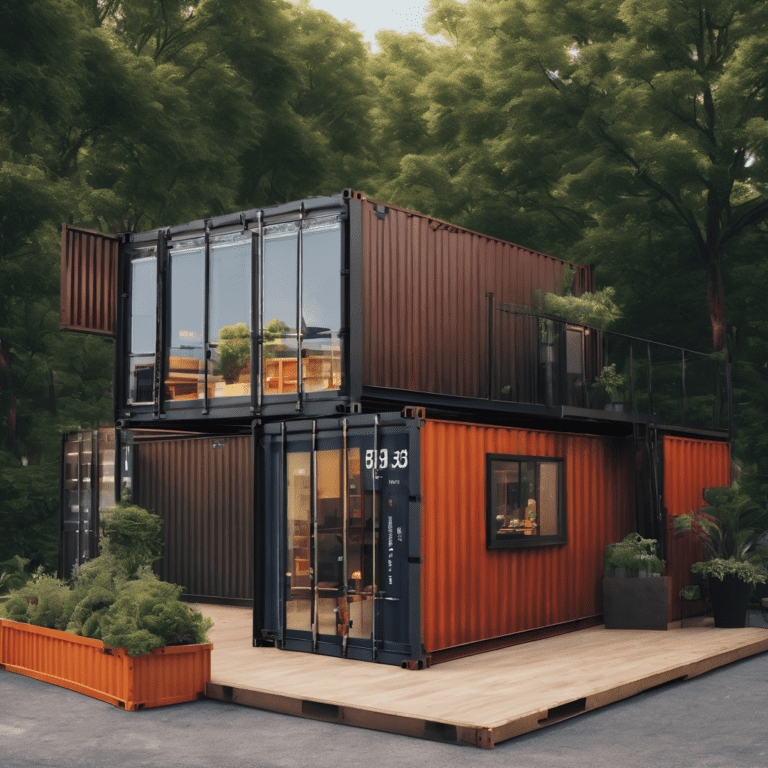Do You Need a Permit for a Shipping Container Home? Everything You Need to Know
Shipping container homes have gained popularity as an affordable, sustainable, and modern housing option. However, one of the biggest concerns potential homeowners have is: Do you need a permit for a shipping container home?
The short answer is yes, in most cases, but the requirements vary depending on zoning laws, residential use regulations, and local building codes. Understanding the permit process is crucial to avoid fines, delays, or even the removal of your container home.
In this guide, we’ll break down everything you need to know about shipping container zoning laws, building permits, and legal restrictions across the U.S., with a focus on tiny homes in Connecticut, small houses in Connecticut, and where you can legally place a shipping container home.

Are Permits Required for Shipping Container Homes?
Understanding Zoning Laws and Residential Use
Zoning laws determine what type of structures can be placed on a property. In some areas, shipping container homes are allowed, while in others, they may be restricted or outright banned.
✅ What to Check with Local Authorities:
- Is your property zoned for residential use?
- Are there property setbacks (minimum space required between structures)?
- Is a shipping container considered a permanent or temporary structure?
🔍 Example: Connecticut and New York have strict zoning regulations, but some towns allow tiny houses, which may apply to shipping container homes.
If you’re considering placing a tiny home on your property, make sure to check the local zoning authorities and understand if your home qualifies as an accessory dwelling unit (ADU).
Do You Need a Building Permit?
A building permit is required for any structure intended for living, including shipping container homes.
✅ Most common permits required:
- Foundation permits (if the container is permanently placed)
- Electrical and plumbing permits
- Structural permits (for modifications like cutting windows, doors, or adding insulation)
🔍 Important for Connecticut Residents:
- Connecticut tiny house laws may influence shipping container zoning laws.
- New York tiny home laws also have strict guidelines for minimum square footage and safety compliance.
- If you’re looking for tiny homes for sale in CT, make sure to check if a shipping container home qualifies under local tiny home regulations.
Shipping Container Home Laws in Different States
📌 Do You Need a Permit for a Shipping Container Home in Connecticut?
Connecticut has some of the strictest regulations for alternative housing. However, some Connecticut cities and counties are open to tiny homes and container homes.
Key Considerations:
- Towns in CT that allow tiny houses may also allow container homes.
- Tiny home communities in CT sometimes welcome shipping container homes.
- Building codes in New Haven County and Hartford County can vary significantly.
- If you’re exploring small houses in Connecticut, a container home may be a viable option.
📌 New York Tiny Home Laws: Can You Use a Shipping Container?
Shipping container homes in New York fall under strict zoning and building regulations.
Important Notes:
- Are shipping container homes legal in New York? Yes, but permits and zoning compliance are required.
- In some cases, a container home may be classified as a mobile home.
- If you’re considering tiny homes in Connecticut or New York, be sure to research if shipping container homes are included in those regulations.
📌 Texas Zoning Laws for Shipping Container Homes
Texas is one of the most container-home-friendly states. However, zoning laws still apply:
- Rural areas have fewer restrictions than urban centers like Dallas or Austin.
- Accessory dwelling unit (ADU) regulations may apply in some counties.
🔍 Want to know the exact requirements in your state? Check with your local zoning authorities.
Where Can You Place a Shipping Container Home?
Even if you have a permit, the placement of your container home is critical. You might be wondering:
Can I put a storage container on my property?
✔️ In most states, storage containers used for non-residential purposes do not require a permit.
Can I put a shipping container in my backyard?
✔️ In some areas, yes, but there may be property setback requirements.
Is a shipping container considered a permanent structure?
✔️ If placed on a foundation, most cities will classify it as a permanent structure requiring full permits
How to Get a Permit for a Shipping Container Home?
To legally place a shipping container home on residential property, follow these 5 essential steps:
Step 1: Research Local Zoning Laws
Visit your city planning or zoning office to check the rules for shipping container zoning laws.
Step 2: Submit a Building Permit Application
You may need to provide architectural blueprints, site plans, and modification details.
Step 3: Comply with Building Codes
Your home must meet International Residential Code (IRC) and local building codes.
Step 4: Schedule Inspections
Your site may need to pass foundation, electrical, and plumbing inspections.
Step 5: Obtain Final Approval
Once all requirements are met, you’ll receive approval to live in your shipping container home.
Can I put a shipping container in my backyard?
✔️ In some areas, yes, but there may be property setback requirements.
Is a shipping container considered a permanent structure?
✔️ If placed on a foundation, most cities will classify it as a permanent structure requiring full permits
Where to Buy a Shipping Container Home Near Me?
If you’re looking for a reliable supplier of shipping containers, UC Containers has everything you need to get started.
🚛 Fast Nationwide Delivery to locations including Connecticut, Texas, Florida, California, New York, and more.
✅ New & Used Shipping Containers (WWT, Cargo Worthy, One-Trip, High Cube)
✅ Custom Modifications (Windows, Doors, Vents)
✅ Financing & Rent-to-Own Options
💡 Check out our inventory here: UC Containers
FAQs About Permits for Shipping Container Homes
Do I need a permit to put a shipping container on my property?
Yes, if used as a home. If used for storage, some areas may not require a permit.
Are shipping container homes legal in Connecticut?
Some Connecticut counties allow tiny homes, which may include container homes. Always check local zoning authorities.
Can I put a tiny home on my property in Connecticut?
Yes, but towns in CT that allow tiny houses have strict building codes and minimum square footage requirements.
How much does a building permit for a container home cost?
Permit fees vary by location but typically range from $500 to $5,000 depending on the state and modifications.
Final Thoughts: Is a Shipping Container Home Right for You?
Building a shipping container home can be an affordable, durable, and eco-friendly housing solution, but it comes with its own set of challenges—primarily zoning laws, building codes, and permit requirements.
Before you start, it’s essential to:
✅ Research local zoning regulations to ensure you can legally place a container home on your property.
✅ Obtain necessary building permits to comply with state and city regulations.
✅ Determine whether your home is considered a temporary or permanent structure, as this can impact what permits you need.
✅ Plan your modifications in advance, such as insulation, plumbing, and electrical systems, to ensure your home meets safety and housing codes.
✅ Check financing and insurance options, as some lenders and insurance companies treat container homes differently than traditional houses.
Whether you’re in Connecticut, New York, Texas, or California, understanding zoning restrictions, residential use classifications, and building codes will save you time, money, and potential legal headaches.
📌 Why Choose UC Containers for Your Shipping Container Home?
If you’re looking for a trusted supplier to purchase a high-quality shipping container, UC Containers has everything you need to get started. We offer:
🚛 Fast Nationwide Delivery – No matter where you are, we can deliver to your location quickly and affordably.
🏡 New & Used Shipping Containers – We provide Wind & Watertight (WWT), Cargo-Worthy, and One-Trip Containers in 20ft, 40ft, and 40ft High Cube sizes.
🛠 Custom Modifications – Need windows, doors, vents, or insulation? We offer customized solutions to fit your housing needs.
💰 Flexible Financing & Rent-to-Own Options – We make it easy to afford your container home with flexible payment plans.
🔧 Expert Support & Free Warranty – With over 1,500+ reviews on Google & BBB, we provide A+ rated service and expert advice.
💡 Start Your Shipping Container Home Journey Today!
📢 Not sure which container is right for you? Our team is here to help!
💬 Contact UC Containers for expert guidance, pricing, and available inventory.
📍 With depots across the U.S., we ensure quick and hassle-free delivery to your location.
Whether you’re a homeowner, small business owner, or builder, UC Containers is your one-stop shop for affordable, high-quality shipping containers for residential or commercial use.
Internal Links to Explore Further
- Complete Guide: Shipping Container Zoning Laws in All 50 States
- Best Locks for Shipping Containers: Protect Your Cargo with High-Security Solutions
- Best Shipping Container Security Camera Systems: 24/7 Surveillance & Remote Monitoring
- How to Burglar-Proof a Shipping Container: The Ultimate Security Guide
- Fire Safety Tips for Shipping Container Storage
- Shipping Container Fireproofing Methods: Protecting Your Fire-Resistant Storage and Living Spaces
- Insurance for Shipping Container Homes: Everything You Need to Know
- How to Comply with Shipping Container Building Codes: A Step-by-Step Guide
- Seismic Safety for Shipping Container Structures: The Ultimate Guide to Earthquake-Resistant Designs
- Are Shipping Containers Safe to Live In?
- Are Shipping Containers Waterproof?
- Shipping Container Zoning Laws by State: A Complete Guide for Homeowners & Businesses
Get quote!

No strings attached 💯